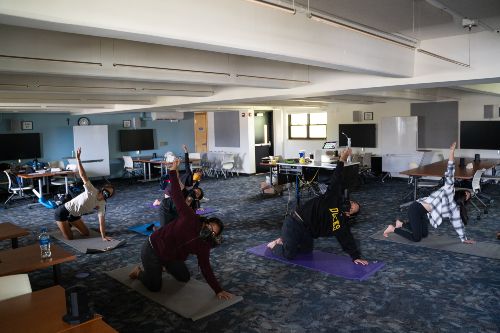Professor Jim Kraus receives Loretta Petrie Award
It was poetic that Chaminade English professor James Kraus, Ph.D., was announced as the recipient of this year’s Loretta Petrie Award by the Hawaii Literary Arts Council (HLAC). After all, the award’s namesake was an early leader of HLAC, and a teacher and administrator at Chaminade University, where she took an active role in its literary magazine and sustained her own lifelong interest in writing. A legacy that Kraus helps perpetuate today on campus.

“This is meaningful because it is recognition for the work I have done on behalf of the literary community, trying to model what it is to be a good ‘literary citizen,’” says Kraus who, incidentally, was hired by Petrie as a full-time Chaminade faculty member in 1985. “I’ve been active in this regard for well over 40 years, since I was in graduate school at the University of Hawaii in the 1970s.”
An avid surfer who started teaching part-time at Chaminade in 1976, Kraus’ formative years were spent studying nuclear engineering with the Navy, with a dream of getting into the United States Coast Guard Academy. Then the Vietnam War happened, and he became a conscientious objector, legally claiming the right to refuse to perform military service on the grounds of freedom, and conscience and thought principles.
“I never wanted anything to do with nuclear technology ever again when I returned from the Navy,” Kraus asserts. “There was a lot going on in those days, including the 1970 massive protests that led to the Kent State shooting.”
From 1980-1984, Kraus was the founder, editor and publisher of Hawai‘i Surf & Sea magazine, a publication dedicated to all aspects of the ocean. It was a passion for Kraus, as was poetry. Today, he is a popular English professor and a prolific author, whose poems have graced multiple magazines and literary journals, including Virginia Quarterly Review, Pequod, Unmuzzled Ox, Kentucky Poetry Review, Bamboo Ridge, Hawaii Review, Neologism Poetry Journal, Poetry Hawaii and elsewhere. His latest essay Poetry and Anti-Nuclearism was published in the volume Toxic Immanence: Decolonizing Nuclear Legacies and Futures (McGill-Queens University Press). He has also recently taught a poetry class at Halawa Correctional Facility as part of Chaminade’s Higher Education in Prison (HEP) program.
“The intent is to honor resident members of the Hawaii literary community whose contributions have benefited the work and advancement of others,” said HLAC officer John Simonds of the Loretta Petrie Award. “The awardees may (but need not) be active writers, professionals or volunteers in roles that may include (but are not limited to) editing, publishing, mentoring, event-organizing, promoting, or serving as creative allies or catalysts.”
Now in its seventh year, the awards were inspired by a bequest from Loretta D. Petrie (1928-2014), whose generosity has enabled the HLAC to honor her legacy of unselfish service, particularly to other writers. The awards have resulted from her unrestricted bequest to the Council, a gift made known after her death in 2014 at age 85. Members of her family living on the mainland agreed with HLAC that such an award would be appropriate to her memory.
A professor of English, Kraus teaches creative writing, American literature and surf studies. Currently, he is the editor of the Chaminade Literary Review (CLR). He is also a past president of the HLAC.
“My experience in the literary community has included participating in the Poets-in-the-schools Program, helping organize and incorporate the Hawaii Literary Arts Council back in the ’70s, sitting on its board in the ’80s, then serving as its president,” says Kraus, who will be on sabbatical in the spring at New York University. “I continue to be active in publishing Chaminade Literary Review—which was initiated by Petrie in 1986—as well as organizing poetry readings and other events.”















